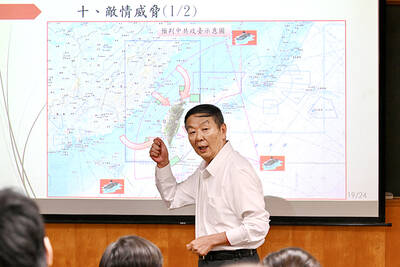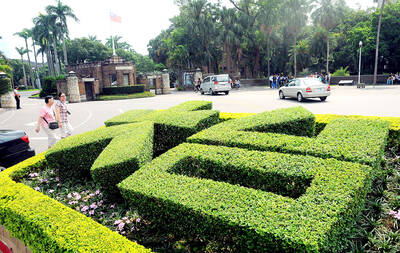President Tsai Ing-wen’s (蔡英文) apology to Aborigines yesterday was met with disappointment by Aboriginal rights advocates for failing to explicitly acknowledge Aboriginal sovereignty, with scattered protests outside the Presidential Office Building in Taipei.
“The problem is that [Tsai] has chosen not to return to [former president] Chen Shui-bian’s (陳水扁) New Partnership quasi-state relationship, not even mentioning it in her remarks,” said Association for Taiwan Indigenous People’s Policy president Yapasuyongu Akuyana, who is a Tsou.
Chen, of the Democratic Progressive Party (DPP), in 2002 signed a New Partnership Accord promising autonomy and partnership through state-to-state relationships with Aborigines, but the accord was ignored by the government of former president Ma Ying-jeou (馬英九).
Tsai yesterday promised an “equal relationship” and “equal talks” with Aborigines as part of a historic and transitional justice commission that she is to head, but stopped short of explicitly affirming Aboriginal sovereignty.
Akuyana said that both the site of the apology and Tsai’s chosen audience showed a disregard for Aboriginal sovereignty.
“The site she chose for the apology used to be the office of the Japanese colonial administration’s governor-general — as if [Aboriginal representatives] were coming for an audience with a monarch,” he said, adding that Tsai should have chosen a neutral setting or an Aboriginal village to show respect.
He also said Tsai mainly invited elected Aboriginal officials — rather than traditional leaders — to observe the event, adding that Republic of China administrative units were a key cause of division and social disruption in Aboriginal communities.
“How could [she] choose to apologize in front of the very people who are responsible for damaging the values and structure of traditional society?” he said, comparing Tsai’s action to “asking a ghost to get your medicine” (請鬼抓藥單).
While Tsai’s promise to establish a new legal service center for Aborigines was positive, her promise to address penalties for hunting non-protected animals ignored the fact that all convictions of Aboriginal hunters have been for hunting “protected” animals, he said.
Aboriginal rights advocates argue that Aboriginal sovereignty should entitle the hunters to exceptions from wildlife protection rules.
“What I saw today was a political show that was put on in an extremely bureaucratic fashion,” said Aboriginal Transitional Justice Alliance president Kumu Hacyo, an independent Tainan city councilor who caucuses with the DPP.
Tsai’s promises to further Aboriginal rights “lacked sincerity” and were “evasive,” because they were not backed up by concrete policy stances, with the president ignoring calls to pass legislation to provide a legal foundation for a proposed Aboriginal justice commission, Hacyo said.
She added that there was a substantial amount of “low-lying fruit” to pick from if Tsai wanted to demonstrate her resolve and spark a national conversation.
Kumu Hacyo cited eliminating state-sponsored sacrifices to Koxinga (鄭成功), whose 17th-century invasion marked the beginning of Chinese rule.
“You should not just talk and apologize to Aborigines — you should also focus on making mainstream society tune in and engage in soul-searching,” she said.
She added that Tsai should also have chosen to immediately recognize members of historic Pingpu (平埔) Aboriginal communities, which have been largely assimilated after centuries of pressure from neighboring Chinese settlers.
Tsai said the government would conduct a review of related legal issues by the end of next month to award Pingpu Aborigines their “rightful” status.
“This issue has been under discussion for a long time — so she should have given a concrete response. Saying you will conduct a review is just being evasive,” Hacyo said.
Meanwhile, more than 30 Aboriginal protesters, led by members of the Pangcah Defense Alliance, clashed with throngs of police who encircled them outside the Presidential Office Building following an overnight vigil.
“We only have one demand — that this flag that has traveled more than 700km be sent into the Presidential Office Building,” said alliance member Kaing Lipay, an Amis.
Protesters early last month began a march from Pingtung County’s Hengchun Township (恆春) along the nation’s east coast to the capital, carrying a flag calling for historical truth and justice for a ritual Paiwan spear.
They repeatedly pushed against the encircling police cordon, eventually reaching the road in front of the Presidential Office Building, before retreating to a tent defiantly erected in the middle of the preceding intersection, circling the tent with a long black banner calling for justice.
“Why is it that the DPP is willing to discuss ‘illicit party assets,’ but will not talk about how it plans to address ‘illicit national assets’ that were plundered from traditional Aboriginal territories?” said Aboriginal singer Panai Kusui, who performed at Tsai’s inauguration, calling the party’s policies “disgraceful.”
A separate group of more than 30 protesters from the Indigenous Peoples’ Long-term Care Alliance marched from the Legislative Yuan to the Presidential Office Building to present a petition, calling for Aboriginal participation in the design of expected long-term care reforms, including the loosening of restrictions on the establishment of long-term care centers in Aboriginal villages, and the allowing of joint management of the centers by villages and the government.

RETHINK? The defense ministry and Navy Command Headquarters could take over the indigenous submarine project and change its production timeline, a source said Admiral Huang Shu-kuang’s (黃曙光) resignation as head of the Indigenous Submarine Program and as a member of the National Security Council could affect the production of submarines, a source said yesterday. Huang in a statement last night said he had decided to resign due to national security concerns while expressing the hope that it would put a stop to political wrangling that only undermines the advancement of the nation’s defense capabilities. Taiwan People’s Party Legislator Vivian Huang (黃珊珊) yesterday said that the admiral, her older brother, felt it was time for him to step down and that he had completed what he

Taiwan has experienced its most significant improvement in the QS World University Rankings by Subject, data provided on Sunday by international higher education analyst Quacquarelli Symonds (QS) showed. Compared with last year’s edition of the rankings, which measure academic excellence and influence, Taiwanese universities made great improvements in the H Index metric, which evaluates research productivity and its impact, with a notable 30 percent increase overall, QS said. Taiwanese universities also made notable progress in the Citations per Paper metric, which measures the impact of research, achieving a 13 percent increase. Taiwanese universities gained 10 percent in Academic Reputation, but declined 18 percent

CHINA REACTS: The patrol and reconnaissance plane ‘transited the Taiwan Strait in international airspace,’ the 7th Fleet said, while Taipei said it saw nothing unusual The US 7th Fleet yesterday said that a US Navy P-8A Poseidon flew through the Taiwan Strait, a day after US and Chinese defense heads held their first talks since November 2022 in an effort to reduce regional tensions. The patrol and reconnaissance plane “transited the Taiwan Strait in international airspace,” the 7th Fleet said in a news release. “By operating within the Taiwan Strait in accordance with international law, the United States upholds the navigational rights and freedoms of all nations.” In a separate statement, the Ministry of National Defense said that it monitored nearby waters and airspace as the aircraft

UNDER DISCUSSION: The combatant command would integrate fast attack boat and anti-ship missile groups to defend waters closest to the coastline, a source said The military could establish a new combatant command as early as 2026, which would be tasked with defending Taiwan’s territorial waters 24 nautical miles (44.4km) from the nation’s coastline, a source familiar with the matter said yesterday. The new command, which would fall under the Naval Command Headquarters, would be led by a vice admiral and integrate existing fast attack boat and anti-ship missile groups, along with the Naval Maritime Surveillance and Reconnaissance Command, said the source, who asked to remain anonymous. It could be launched by 2026, but details are being discussed and no final timetable has been announced, the source